Fleurs du Mal Magazine


In materials as diverse as wood, steel, bronze, latex, marble, plaster, resin, hemp, lead, ink, pencil, crayon, woodcut, watercolor and gouache, Louise Bourgeois (1911–2010) investigates every imaginable manifestation of the spiral, from graphic patterns to graphite whorls, wobbly orbits to chiseled vortices, twisted columns to coiling snakes, staircases and pyramids.
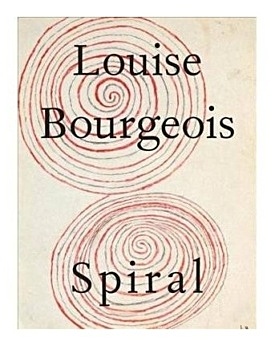 The cursive blue-paper word drawings also included, in English and French, complement the purely visual works by conveying the spirit of Bourgeois’ writing in extraordinary pictorial forms.
The cursive blue-paper word drawings also included, in English and French, complement the purely visual works by conveying the spirit of Bourgeois’ writing in extraordinary pictorial forms.
Bourgeois called the spiral “an attempt at controlling the chaos. It has two directions. Where do you place yourself, at the periphery or at the vortex?”
In another context, she has also stated “I would dream of my father’s mistress. I would do it in my dreams by wringing her neck.
The spiral—I love the spiral—represents control and freedom.”
Louise Bourgeois:
Spiral
Text by Louise Bourgeois (Artist)
Hardcover
84 pages
Publisher: Damiani
(February 19, 2019)
Language: English
ISBN-10: 886208644X
ISBN-13: 978-8862086448
Product Dimensions: 9.2 x 0.8 x 12 inches
$50.00
# new book
Louise Bourgeois
Spiral
• fleursdumal.nl magazine
More in: - Book News, - Bookstores, Archive A-B, Art & Literature News, Louise Bourgeois, Sculpture
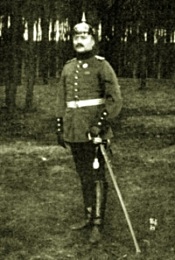
Siede
Meine Schwäche hält sich mühsam
An den eigenen Händen
Mit meinen Kräften
Spielen deine Knöchel
Fangeball!
In deinem Schreiten knistert
Hin
Mein Denken
Und
Dir im Auggrund
Stirbt
Mein letztes Will!
Dein Hauch zerweht mich
Schreivoll in Verlangen
Kühl
Kränzt dein Tändeln
In das Haar
Sich
Lächelnd
Meine Qual!
August Stramm
(1874-1915)
Siede, 1914
• fleursdumal.nl magazine
More in: *War Poetry Archive, Archive S-T, Expressionism, Stramm, August
A MATTER OF DOCTRINE
There was great excitement in Miltonville over the advent of a most eloquent and convincing minister from the North.
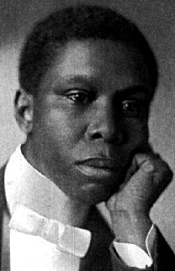 The beauty about the Rev. Thaddeus Warwick was that he was purely and simply a man of the doctrine. He had no emotions, his sermons were never matters of feeling; but he insisted so strongly upon the constant presentation of the tenets of his creed that his presence in a town was always marked by the enthusiasm and joy of religious disputation.
The beauty about the Rev. Thaddeus Warwick was that he was purely and simply a man of the doctrine. He had no emotions, his sermons were never matters of feeling; but he insisted so strongly upon the constant presentation of the tenets of his creed that his presence in a town was always marked by the enthusiasm and joy of religious disputation.
The Rev. Jasper Hayward, coloured, was a man quite of another stripe. With him it was not so much what a man held as what he felt. The difference in their characteristics, however, did not prevent him from attending Dr. Warwick’s series of sermons, where, from the vantage point of the gallery, he drank in, without assimilating, that divine’s words of wisdom.
Especially was he edified on the night that his white brother held forth upon the doctrine of predestination. It was not that he understood it at all, but that it sounded well and the words had a rich ring as he champed over them again and again.
Mr. Hayward was a man for the time and knew that his congregation desired something new, and if he could supply it he was willing to take lessons even from a white co-worker who had neither “de spi’it ner de fiah.” Because, as he was prone to admit to himself, “dey was sump’in’ in de unnerstannin’.”
He had no idea what plagiarism is, and without a single thought of wrong, he intended to reproduce for his people the religious wisdom which he acquired at the white church. He was an innocent beggar going to the doors of the well-provided for cold spiritual victuals to warm over for his own family. And it would not be plagiarism either, for this very warming-over process would save it from that and make his own whatever he brought. He would season with the pepper of his homely wit, sprinkle it with the salt of his home-made philosophy, then, hot with the fire of his crude eloquence, serve to his people a dish his very own. But to the true purveyor of original dishes it is never pleasant to know that someone else holds the secret of the groundwork of his invention.
It was then something of a shock to the Reverend Mr. Hayward to be accosted by Isaac Middleton, one of his members, just as he was leaving the gallery on the night of this most edifying of sermons.
Isaac laid a hand upon his shoulder and smiled at him benevolently.
“How do, Brothah Hayward,” he said, “you been sittin’ unner de drippin’s of de gospel, too?”
“Yes, I has been listenin’ to de wo’ds of my fellow-laborah in de vineya’d of de Lawd,” replied the preacher with some dignity, for he saw vanishing the vision of his own glory in a revivified sermon on predestination.
Isaac linked his arm familiarly in his pastor’s as they went out upon the street.
“Well, what you t’ink erbout pre-o’dination an’ fo’-destination any how?”
“It sutny has been pussented to us in a powahful light dis eve’nin’.”
“Well, suh, hit opened up my eyes. I do’ know when I’s hyeahed a sehmon dat done my soul mo’ good.”
“It was a upliftin’ episode.”
“Seem lak ‘co’din’ to de way de brothah ‘lucidated de matter to-night dat evaht’ing done sot out an’ cut an’ dried fu’ us. Well dat’s gwine to he’p me lots.”
“De gospel is allus a he’p.”
“But not allus in dis way. You see I ain’t a eddicated man lak you, Brothah Hayward.”
“We can’t all have de same ‘vantages,” the preacher condescended. “But what I feels, I feels, an’ what I unnerstan’s, I unnerstan’s. The Scripture tell us to get unnerstannin’.”
“Well, dat’s what I’s been a-doin’ to-night. I’s been a-doubtin’ an’ a-doubtin’, a-foolin’ erroun’ an’ wonderin’, but now I unnerstan’.”
“‘Splain yo’se’f, Brothah Middleton,” said the preacher.
“Well, suh, I will to you. You knows Miss Sally Briggs? Huh, what say?”
The Reverend Hayward had given a half discernible start and an exclamation had fallen from his lips.
“What say?” repeated his companion.
“I knows de sistah ve’y well, she bein’ a membah of my flock.”
“Well, I been gwine in comp’ny wit dat ooman fu’ de longes’. You ain’t nevah tasted none o’ huh cookin’, has you?”
“I has ‘sperienced de sistah’s puffo’mances in dat line.”
“She is the cookin’est ooman I evah seed in all my life, but howsomedever, I been gwine all dis time an’ I ain’ nevah said de wo’d. I nevah could git clean erway f’om huh widout somep’n’ drawin’ me back, an’ I didn’t know what hit was.”
The preacher was restless.
“Hit was des dis away, Brothah Hayward, I was allus lingerin’ on de brink, feahful to la’nch away, but now I’s a-gwine to la’nch, case dat all dis time tain’t been nuffin but fo’-destination dat been a-holdin’ me on.”
“Ahem,” said the minister; “we mus’ not be in too big a hu’y to put ouah human weaknesses upon some divine cause.”
“I ain’t a-doin’ dat, dough I ain’t a-sputin’ dat de lady is a mos’ oncommon fine lookin’ pusson.”
“I has only seed huh wid de eye of de spi’it,” was the virtuous answer, “an’ to dat eye all t’ings dat are good are beautiful.”
“Yes, suh, an’ lookin’ wid de cookin’ eye, hit seem lak’ I des fo’destinated fu’ to ma’y dat ooman.”
“You say you ain’t axe huh yit?”
“Not yit, but I’s gwine to ez soon ez evah I gets de chanst now.”
“Uh, huh,” said the preacher, and he began to hasten his steps homeward.
“Seems lak you in a pow’ful hu’y to-night,” said his companion, with some difficulty accommodating his own step to the preacher’s masterly strides. He was a short man and his pastor was tall and gaunt.
“I has somp’n’ on my min,’ Brothah Middleton, dat I wants to thrash out to-night in de sollertude of my own chambah,” was the solemn reply.
“Well, I ain’ gwine keep erlong wid you an’ pestah you wid my chattah, Brothah Hayward,” and at the next corner Isaac Middleton turned off and went his way, with a cheery “so long, may de Lawd set wid you in yo’ meddertations.”
“So long,” said his pastor hastily. Then he did what would be strange in any man, but seemed stranger in so virtuous a minister. He checked his hasty pace, and, after furtively watching Middleton out of sight, turned and retraced his steps in a direction exactly opposite to the one in which he had been going, and toward the cottage of the very Sister Griggs concerning whose charms the minister’s parishioner had held forth.
It was late, but the pastor knew that the woman whom he sought was industrious and often worked late, and with ever increasing eagerness he hurried on. He was fully rewarded for his perseverance when the light from the window of his intended hostess gleamed upon him, and when she stood in the full glow of it as the door opened in answer to his knock.
“La, Brothah Hayward, ef it ain’t you; howdy; come in.”
“Howdy, howdy, Sistah Griggs, how you come on?”
“Oh, I’s des tol’able,” industriously dusting a chair. “How’s yo’se’f?”
“I’s right smaht, thankee ma’am.”
“W’y, Brothah Hayward, ain’t you los’ down in dis paht of de town?”
“No, indeed, Sistah Griggs, de shep’erd ain’t nevah los’ no whaih dey’s any of de flock.” Then looking around the room at the piles of ironed clothes, he added: “You sutny is a indust’ious ooman.”
“I was des ’bout finishin’ up some i’onin’ I had fu’ de white folks,” smiled Sister Griggs, taking down her ironing-board and resting it in the corner. “Allus when I gits thoo my wo’k at nights I’s putty well tiahed out an’ has to eat a snack; set by, Brothah Hayward, while I fixes us a bite.”
“La, sistah, hit don’t skacely seem right fu’ me to be a-comin’ in hyeah lettin’ you fix fu’ me at dis time o’ night, an’ you mighty nigh tuckahed out, too.”
“Tsch, Brothah Hayward, taint no ha’dah lookin’ out fu’ two dan it is lookin’ out fu’ one.”
Hayward flashed a quick upward glance at his hostess’ face and then repeated slowly, “Yes’m, dat sutny is de trufe. I ain’t nevah t’ought o’ that befo’. Hit ain’t no ha’dah lookin’ out fu’ two dan hit is fu’ one,” and though he was usually an incessant talker, he lapsed into a brown study.
Be it known that the Rev. Mr. Hayward was a man of a very level head, and that his bachelorhood was a matter of economy. He had long considered matrimony in the light of a most desirable estate, but one which he feared to embrace until the rewards for his labours began looking up a little better. But now the matter was being presented to him in an entirely different light. “Hit ain’t no ha’dah lookin’ out fu’ two dan fu’ one.” Might that not be the truth after all. One had to have food. It would take very little more to do for two. One had to have a home to live in. The same house would shelter two. One had to wear clothes. Well, now, there came the rub. But he thought of donation parties, and smiled. Instead of being an extravagance, might not this union of two beings be an economy? Somebody to cook the food, somebody to keep the house, and somebody to mend the clothes.
His reverie was broken in upon by Sally Griggs’ voice. “Hit do seem lak you mighty deep in t’ought dis evenin’, Brothah Hayward. I done spoke to you twicet.”
“Scuse me, Sistah Griggs, my min’ has been mighty deeply ‘sorbed in a little mattah o’ doctrine. What you say to me?”
“I say set up to the table an’ have a bite to eat; tain’t much, but ‘sich ez I have’—you know what de ‘postle said.”
The preacher’s eyes glistened as they took in the well-filled board. There was fervour in the blessing which he asked that made amends for its brevity. Then he fell to.
Isaac Middleton was right. This woman was a genius among cooks. Isaac Middleton was also wrong. He, a layman, had no right to raise his eyes to her. She was the prize of the elect, not the quarry of any chance pursuer. As he ate and talked, his admiration for Sally grew as did his indignation at Middleton’s presumption.
Meanwhile the fair one plied him with delicacies, and paid deferential attention whenever he opened his mouth to give vent to an opinion. An admirable wife she would make, indeed.
At last supper was over and his chair pushed back from the table. With a long sigh of content, he stretched his long legs, tilted back and said: “Well, you done settled de case ez fur ez I is concerned.”
“What dat, Brothah Hayward?” she asked.
“Well, I do’ know’s I’s quite prepahed to tell you yit.”
“Hyeah now, don’ you remembah ol’ Mis’ Eve? Taint nevah right to git a lady’s cur’osity riz.”
“Oh, nemmine, nemmine, I ain’t gwine keep yo’ cur’osity up long. You see, Sistah Griggs, you done ‘lucidated one p’int to me dis night dat meks it plumb needful fu’ me to speak.”
She was looking at him with wide open eyes of expectation.
“You made de ’emark to-night, dat it ain’t no ha’dah lookin’ out aftah two dan one.”
“Oh, Brothah Hayward!”
“Sistah Sally, I reckernizes dat, an’ I want to know ef you won’t let me look out aftah we two? Will you ma’y me?”
She picked nervously at her apron, and her eyes sought the floor modestly as she answered, “Why, Brothah Hayward, I ain’t fittin’ fu’ no sich eddicated man ez you. S’posin’ you’d git to be pu’sidin’ elder, er bishop, er somp’n’ er othah, whaih’d I be?”
He waved his hand magnanimously. “Sistah Griggs, Sally, whatevah high place I may be fo’destined to I shall tek my wife up wid me.”
This was enough, and with her hearty yes, the Rev. Mr. Hayward had Sister Sally close in his clerical arms. They were not through their mutual felicitations, which were indeed so enthusiastic as to drown the sound of a knocking at the door and the ominous scraping of feet, when the door opened to admit Isaac Middleton, just as the preacher was imprinting a very decided kiss upon his fiancee’s cheek.
“Wha’—wha'” exclaimed Middleton.
The preacher turned. “Dat you, Isaac?” he said complacently. “You must ‘scuse ouah ‘pearance, we des got ingaged.”
The fair Sally blushed unseen.
“What!” cried Isaac. “Ingaged, aftah what I tol’ you to-night.” His face was a thundercloud.
“Yes, suh.”
“An’ is dat de way you stan’ up fu’ fo’destination?”
This time it was the preacher’s turn to darken angrily as he replied, “Look a-hyeah, Ike Middleton, all I got to say to you is dat whenevah a lady cook to please me lak dis lady do, an’ whenevah I love one lak I love huh, an’ she seems to love me back, I’s a-gwine to pop de question to huh, fo’destination er no fo’destination, so dah!”
The moment was pregnant with tragic possibilities. The lady still stood with bowed head, but her hand had stolen into her minister’s. Isaac paused, and the situation overwhelmed him. Crushed with anger and defeat he turned toward the door.
On the threshold he paused again to say, “Well, all I got to say to you, Hayward, don’ you nevah talk to me no mor’ nuffin’ ’bout doctrine!”
Paul Laurence Dunbar
(1872 – 1906)
A Matter Of Doctrine
From The Heart Of Happy Hollow, a collection of short stories reprinted in 1904 by Dodd, Mead and Company, New York.
Short Story
• fleursdumal.nl magazine
More in: *Archive African American Literature, Archive C-D, Archive C-D, Dunbar, Paul Laurence, Dunbar, Paul Laurence, Paul Laurence Dunbar, Paul Laurence Dunbar

Pol Kurucz: Politicas
“Politicas” (non existant female version of “Politicos”, meaning politician in latin languages) promotes the role of women in politics via provocative scenes in which each “Politica” campaigns in her own, witty way.
Pol Kurucz was born with two different names to a French mother in a Hungarian hospital. His childhood hyperactivity was treated with theater, and theater was later treated with finance. By 27 he was a manager by day and a stage director by night. He then went on consecutive journeys to Bahrain and Brazil, to corporate islands and favelas. He has sailed on the shores of the adult industry and of militant feminism and launched a mainstream money making bar loss making in its indie art basement. Then he suddenly died of absurdity. Pol was reborn in 2015 and merged his two names and his contradictory lives into one where absurdity makes sense.
Today he works on eccentric fashion, celebrity and fine art projects in São Paulo and New York. His photos have been featured in over a hundred publications including: Vogue, ELLE, Glamour, Marie Claire, The Guardian, Dazed, Adobe Create, Hunger, Sleek, Nylon, Hi-Fructose, Galore. Pol’s works were exhibited worldwide in 72 galleries and cultural events in 2018 including: Juxtapoz Club House (Art Basel Miami), ArtExpo NYC, Red Dot Miami, Lincoln Center NYC, Shanghai Fashion Week, New York Fashion Week, Superchief Gallery Miami, Lumas Galleries worldwide, Democrart Galleries in Brazil and Pica Photo shows in China.
# more on website pol kurucz
www.polkurucz.com (politicas: www.polkurucz.com/politicas)
• fleursdumal.nl magazine
More in: Art & Literature News, FDM Art Gallery, Photography, Pol Kurucz, Surrealisme, THEATRE
The dramatic, larger-than-life true story behind the founding of Oculus and its quest for virtual reality, by the bestselling author of Console Wars.
 In The History of the Future, Harris once again deep-dives into a tech drama for the ages to expertly tell the larger-than-life true story of Oculus, the virtual reality company founded in 2012 that—less than two years later—would catch the attention of Mark Zuckerberg and wind up being bought by Facebook for over $2 billion dollars.
In The History of the Future, Harris once again deep-dives into a tech drama for the ages to expertly tell the larger-than-life true story of Oculus, the virtual reality company founded in 2012 that—less than two years later—would catch the attention of Mark Zuckerberg and wind up being bought by Facebook for over $2 billion dollars.
This incredible underdog story begins with inventor Palmer Luckey, then just a nineteen-year-old dreamer, living alone in a camper trailer in Long Beach, California. At the time, virtual reality—long-hailed as the ultimate technology—was so costly and experimental that it was unattainable outside of a few research labs and military training facilities. But with the founding of Oculus, and the belief that his tantalizing vision of the future could one day be more than science fiction, Luckey put everything he had into creating a device that would allow gamers like him to step into virtual worlds and, in doing so, hopefully kickstart a VR revolution.
Over the course of three years, Harris conducted hundreds of interviews with key players in the VR revolution—including Luckey, his partners, and their cult of dreamers—to weave together a rich, cinematic narrative that captures the breakthroughs, breakdowns, and human drama of trying to change the world.
The result is a supremely accessible, entertaining look at the birth of a new multi-billion-dollar industry; one full of heroes, villains, and twists at every corner. Take, for instance, Harris’ own discovery while writing this story. When he started this endeavor, he had no idea that this tale would somehow involve Donald Trump, billion-dollar lawsuits, illegal practices, and end with Luckey—eventually ousted from Facebook—as one of the most polarizing figures in Silicon Valley.
The History of the Future.
Oculus, Facebook, and the Revolution That Swept Virtual Reality
by Blake J. Harris
Hardcover
Pages: 528
HarperCollins Publishers
Imprint: Dey Street Books
On Sale: 02/19/2019
ISBN: 9780062455963
ISBN 10: 0062455966
Computers / Virtual Worlds
List Price: 28.99 USD
# new books
The History of the Future
Blake J. Harris
• fleursdumal.nl magazine
More in: - Book News, Archive G-H, Art & Literature News, AUDIO, CINEMA, RADIO & TV, Exhibition Archive, Photography, Visual & Concrete Poetry
Thija komt buiten met haar reistas. Ze heeft een mantelpakje aan, lichtgrijs, rood afgebiesd. Ze ziet eruit als een dochter van een deftige familie, die naar kostschool vertrekt. Ze heeft een strik in het haar, net als op zondag wanneer ze naar de kerk gaat.
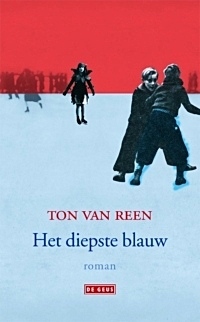 Ze zet de reistas op de grond en gaat erop zitten. Haar onmogelijk lange rok hangt op het trottoir, zodat ze hem wat op moet trekken.
Ze zet de reistas op de grond en gaat erop zitten. Haar onmogelijk lange rok hangt op het trottoir, zodat ze hem wat op moet trekken.
Mels gaat op de stoep zitten, aan de andere kant van de straat, want hij is ontzettend boos.
Thija vijlt haar nagels.
`Hou op met dat gedoe’, zegt hij boos.
`Ik schrijf je toch’, zegt Thija. `Ik vergeet je echt niet.’
`Weet je nu waar je gaat wonen?’
`Rotterdam, dat zei ik toch. Ik schrijf je volgende week al. Elke week schrijf ik.’
Er rijdt een auto door de straat, langzaam. Passeert hen. Even is ze uit zijn ogen weg. Dat even doet al pijn.
`Ik heb een cadeau voor je.’
`Wat is het?’ vraagt hij.
`Kom het maar halen.’
`Je moet het me brengen.’
Blijkbaar hoort ze aan zijn toon dat hij niet toe zal geven, zeker niet nu hij zo geweldig boos is over het afscheid. Ze staat op en steekt de straat over. De rok hangt bijna op haar schoenen. De neuzen glimmen.
Uit haar reistas pakt ze een doosje, met een lint eromheen.
`Je mag het pas uitpakken als ik weg ben.’
`Goed.’
Hij neemt het pakje aan en steekt het in zijn zak.
Ze komt naast hem zitten. Even is het alsof er niets aan de hand is, alsof ze een spelletje gaan doen dat de hele dag zal duren. Zoals ze het zo vaak gedaan hebben. Raden waar je naar kijkt. De stemmen van voorbijgangers nadoen. Of gewoon verhalen vertellen.
Haar moeder komt buiten en zet een paar dozen met huisraad op de stoep.
`Nemen jullie niet alles mee?’
`De koffers worden later opgehaald. Ze zijn nooit uitgepakt. Eigenlijk hebben we er niets van nodig. Voorlopig gaan we in een hotel wonen, tot we een huis hebben gevonden.’
Ze slaat een arm om hem heen. Hij voelt hoe warm haar arm is, ook al is die nog zo dun. Haar huid is van zijde.
`Ik wil liever blijven’, zegt ze. `Ik vind het net zo erg als jij. Maar het kan niet. Als je ouders verhuizen, moet je mee.’
Een auto rijdt voor en stopt voor haar deur. Thija’s vader stapt uit. Mels heeft hem nog nooit gezien. Hij schrikt een beetje van hem. Het is een oudere, forse en grijze man. Niet veel jonger dan zijn grootvader. Niet de vader die hij had verwacht. De man groet hem niet, hij kijkt gewoon over hem heen. Het is een man die het druk heeft, dat kun je zo aan hem zien. Daarom neemt hij hen nu mee naar Rotterdam, om hen vaker te zien. Mels snapt het, maar het is niet eerlijk.
Haar vader laadt de dozen in de achterbak en klopt het stof van zijn handen.
Mels voelt de tranen langs zijn wangen lopen.
`Niet doen’, zegt ze. `Ik schrijf je toch. Ik schrijf je alles wat ik nog over China weet.’
`Je gaat naar Rotterdam!’
`Kom op, we hebben weinig tijd’, zegt haar moeder. `Je moet nu afscheid nemen.’ Ze strijkt Mels over het haar en loopt naar de auto.
`Nou, ik moet gaan.’ Thija staat op en geeft hem een kus.
Door zijn tranen heen ziet Mels haar in de auto stappen. Hij ziet hoe die stomme rok van haar even blijft haken. Ze valt bijna de auto in. Als hij een pistool had zou hij haar vader doodschieten. Maar misschien ook niet. Hij weet het niet. Hij is verlamd. Hij zou niet eens kunnen schieten.
De auto rijdt de straat uit. Ze zwaait. Hij wil terugzwaaien, maar het gaat niet. Hij is versteend. Het liefst was hij dood.
Pas als de auto al een uur weg is, of misschien wel twee uur, gaat hij naar huis.
Op zijn kamer pakt hij het cadeautje uit. Het is papier over papier. Laag na laag. Het pakje wordt steeds kleiner. Ten slotte blijft er een klein velletje van een kladblok over.
`Misschien gaan we zo ver weg dat ik je nooit meer zal zien’, leest hij. `We blijven maar even in Rotterdam. Een paar dagen, of een paar weken. Dan vertrekken we naar China, waar mijn vader op een theeplantage gaat werken. Ik weet niet eens in welk China. Hij zegt er niets over tegen mij, maar ik denk dat hij Formosa bedoelt. Meer weet ik er ook niet van. Misschien kom ik later naar Nederland terug, om te studeren. Ik moest dit opschrijven, want ik kon het je niet vertellen omdat ik zelf niet wil dat het gebeurt. Ik wil niet zonder jou naar China. Maar ook al zou ik je nooit meer zien, je moet weten dat ik altijd net zo veel van jou zal houden als van Tijger. Thija.’
Liggend op bed perst hij zijn hoofd zo vast in het kussen dat alles zwart wordt. Hij wil net zo dood zijn als Tijger.
Ton van Reen: Het diepste blauw (099)
wordt vervolgd
• fleursdumal.nl magazine
More in: - Book News, - Het diepste blauw, Archive Q-R, Reen, Ton van

Selfie
van Gerrit Achterberg
Hoe zal nu in het huis de stilte zijn?
Val ik tezamen met uw lijn?
Mijn ledematen worden van ivoor.
Ik ben bij u gekomen, binnendoor.
Nooit was ik zo geheel en zo bijeen
terechtgekomen, ogen wijd uiteen.
Ontschorste bomen liggen aan de kant.
God heeft een buiten- en een binnenkant.
Bert Bevers
Hoe zal nu in het huis de stilte zijn? is een sample uit Distantie
Val ik tezamen met uw lijn? is een sample uit 13
Mijn ledematen worden van ivoor. is een sample uit Smaragd
Ik ben bij u gekomen, binnendoor. is een sample uit Oculair
Nooit was ik zo geheel en zo bijeen. is een sample uit Tracé
Terechtgekomen, ogen wijd uiteen is een sample uit Lucifer
Ontschorste bomen liggen aan de kant is een bijna-sample uit Station
God heeft een buiten- en een binnenkant. is een sample uit Reflexie
Selfie van Gerrit Achterberg
Verschenen in Je tikt er tegen en het zingt, Demer Uitgeverij, Leusden, 2015
Bert Bevers is a poet and writer who lives and works in Antwerp (Be)
• fleursdumal.nl magazine
More in: Achterberg, Gerrit, Archive A-B, Archive A-B, Bevers, Bert
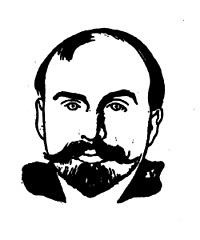
Hugo
J’ai un portrait d’Hugo, en face sur le mur,
Et quand je le regarde, et quand le vers est dur
A terminer, son oeil, et sa barbe si douce
Me donnent bon courage et les mots sous son pouce
S’alignent sans efforts et je relis ses vers
Si doux et si charmants, plus calmes que les mers.
“J’étais seul près des flots par une nuit d’étoiles;
“Pas un nuage au ciel, sur la mer pas de voiles,
“Mes yeux plongeaient plus loin que le monde réel
“Et les bois et les monts, et toute la nature
“Semblaient interroger dans un confus murmure
“Les flots des mers, les feux du ciel.”
. . . . . . . . . . . .
. . . . . . . . . . . .
Marcel Schwob
(1867-1905)
Hugo
Mai 1881
Portrait: Félix Vallotton
• fleursdumal.nl magazine
More in: Archive S-T, Archive S-T, Félix Vallotton, Marcel Schwob, Victor Hugo
1677. Un groupe d’intellectuels publie à Amsterdam un livre intitulé Œuvres posthumes avec pour nom d’auteur : B.d.S.
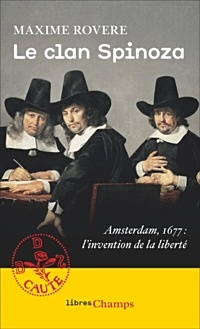 Qui se cache derrière ces initiales? Bento de Spinoza, certes… mais pas seulement.
Qui se cache derrière ces initiales? Bento de Spinoza, certes… mais pas seulement.
Son livre est le produit d’échanges palpitants entre les savants de toute l’Europe, de querelles entre les communautés juives et chrétiennes mal unies, d’amitiés éternelles et même d’amours déçues.
Cette fantaisie historique et philosophique, entièrement fondée sur les faits et les textes, transforme la biographie du philosophe Spinoza en un fascinant portrait d’hommes et de femmes épris de liberté, lancés dans l’aventure de la raison moderne.
Synthèse de décennies de recherches collectives, le roman de Maxime Rovere éclaire la naissance et les enjeux d’une philosophie qui n’en finit pas de nous aider à comprendre le monde, et nous avec lui.
Maxime Rovere
Le clan Spinoza
Amsterdam, 1677.
L’invention de la liberté
Littérature française
Libres Champs
560 pages
109 x 178 mm
Broché
Paru le 23/01/2019
EAN : 9782081422506
ISBN : 9782081422506
Prix : €10,00
# more books
Maxime Rovere
Le clan Spinoza
Littérature française
• fleursdumal.nl magazine
More in: - Book News, - Book Stories, Archive Q-R, Archive S-T, Art & Literature News, Spinoza
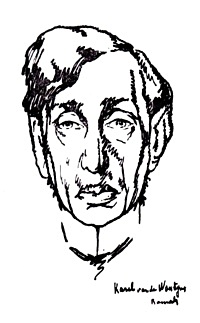
Er komt iemand bij mij
Er komt iemand bij mij, die ‘k nimmer zag,
en uit-der-mate vriendlijk, die mij zegt:
‘Gij weet, ik berg iemand in mijne woon.
Neen: er verbergt zich iemand in mijn woon.
Ik zie hem niet, maar ben in hem begaan.
Ik ken hem, en hij is mijn liefst bezit…’
– Ik durf niet zeggen dat die vreemdling liegt.
Ik durf niet zeggen dat zijn gast de mijne is. Ach!
ik durf niet zèggen dat hij niet bestaat, misschien.
Want hij bestaat in mij.
Karel van de Woestijne
(1878 – 1929)
Er komt iemand bij mij
Portret: Karel van de Woestijne, Ramah – Journal Het Roode Zeil, 15 April 1920
• fleursdumal.nl magazine
More in: Archive W-X, Archive W-X, Woestijne, Karel van de
THE INTERFERENCE OF PATSY ANN
Patsy Ann Meriweather would have told you that her father, or more properly her “pappy,” was a “widover,” and she would have added in her sad little voice, with her mournful eyes upon you, that her mother had “bin daid fu’ nigh onto fou’ yeahs.” Then you could have wept for Patsy, for her years were only thirteen now, and since the passing away of her mother she had been the little mother for her four younger brothers and sisters, as well as her father’s house-keeper.
 But Patsy Ann never complained; she was quite willing to be all that she had been until such time as Isaac and Dora, Cassie and little John should be old enough to care for themselves, and also to lighten some of her domestic burdens. She had never reckoned upon any other manner of release. In fact her youthful mind was not able to contemplate the possibility of any other manner of change. But the good women of Patsy’s neighbourhood were not the ones to let her remain in this deplorable state of ignorance. She was to be enlightened as to other changes that might take place in her condition, and of the unspeakable horrors that would transpire with them.
But Patsy Ann never complained; she was quite willing to be all that she had been until such time as Isaac and Dora, Cassie and little John should be old enough to care for themselves, and also to lighten some of her domestic burdens. She had never reckoned upon any other manner of release. In fact her youthful mind was not able to contemplate the possibility of any other manner of change. But the good women of Patsy’s neighbourhood were not the ones to let her remain in this deplorable state of ignorance. She was to be enlightened as to other changes that might take place in her condition, and of the unspeakable horrors that would transpire with them.
It was upon the occasion that little John had taken it into his infant head to have the German measles just at the time that Isaac was slowly recovering from the chicken-pox. Patsy Ann’s powers had been taxed to the utmost, and Mrs. Caroline Gibson had been called in from next door to superintend the brewing of the saffron tea, and for the general care of the fretful sufferer.
To Patsy Ann, then, in ominous tone, spoke this oracle. “Patsy Ann, how yo’ pappy doin’ sence Matildy died?” “Matildy” was the deceased wife.
“Oh, he gittin’ ‘long all right. He was mighty broke up at de fus’, but he ‘low now dat de house go on de same’s ef mammy was a-livin’.”
“Oom huh,” disdainfully; “Oom huh. Yo’ mammy bin daid fou’ yeahs, ain’t she?”
“Yes’m; mighty nigh.”
“Oom huh; fou’ yeahs is a mighty long time fu’ a colo’d man to wait; but we’n he do wait dat long, hit’s all de wuss we’n hit do come.”
“Pap bin wo’kin right stiddy at de brick-ya’d,” said Patsy, in loyal defence against some vaguely implied accusation, “an’ he done put some money in de bank.”
“Bad sign, bad sign,” and Mrs. Gibson gave her head a fearsome shake.
But just then the shrill voice of little John calling for attention drew her away and left Patsy Ann to herself and her meditations.
What could this mean?
When that lady had finished ministering to the sick child and returned, Patsy Ann asked her, “Mis’ Gibson, what you mean by sayin’ ‘bad sign, bad sign?'”
Again the oracle shook her head sagely. Then she answered, “Chil’, you do’ know de dev’ment dey is in dis worl’.”
“But,” retorted the child, “my pappy ain’ up to no dev’ment, ‘case he got ‘uligion an’ bin baptised.”
“Oom-m,” groaned Sistah Gibson, “dat don’ mek a bit o’ diffunce. Who is any mo’ ma’yin’ men den de preachahs demse’ves? W’y Brothah ‘Lias Scott done tempted matermony six times a’ready, an’ ‘s lookin’ roun’ fu’ de sebent, an’ he’s a good man, too.”
“Ma’yin’,” said Patsy breathlessly.
“Yes, honey, ma’yin’, an’ I’s afeared yo’ pappy’s got notions in his haid, an’ w’en a widower git gals in his haid dey ain’ no use a-pesterin’ wid ’em, ‘case dey boun’ to have dey way.”
“Ma’yin’,” said Patsy to herself reflectively. “Ma’yin’.” She knew what it meant, but she had never dreamed of the possibility of such a thing in connection with her father. “Ma’yin’,” and yet the idea of it did not seem so very unalluring.
She spoke her thoughts aloud.
“But ef pap ‘u’d ma’y, Mis’ Gibson, den I’d git a chanct to go to school. He allus sayin’ he mighty sorry ’bout me not goin’.”
“Dah now, dah now,” cried the woman, casting a pitying glance at the child, “dat’s de las’ t’ing. He des a feelin’ roun’ now. You po’, ign’ant, mothahless chil’. You ain’ nevah had no step-mothah, an’ you don’ know what hit means.”
“But she’d tek keer o’ the chillen,” persisted Patsy.
“Sich tekin’ keer of ’em ez hit ‘u’d be. She’d keer fu’ ’em to dey graves. Nobody cain’t tell me nuffin ’bout step-mothahs, case I knows ’em. Dey ain’ no ooman goin’ to tek keer o’ nobody else’s chile lak she’d tek keer o’ huh own,” and Patsy felt a choking come into her throat and a tight sensation about her heart while she listened as Mrs. Gibson regaled her with all the choice horrors that are laid at the door of step-mothers.
From that hour on, one settled conviction took shape and possessed Patsy Ann’s mind; never, if she could help it, would she run the risk of having a step-mother. Come what may, let her be compelled to do what she might, let the hope of school fade from her sight forever and a day—but no step-mother should ever cast her baneful shadow over Patsy Ann’s home.
Experience of life had made her wise for her years, and so for the time she said nothing to her father; but she began to watch him with wary eyes, his goings out and his comings in, and to attach new importance to trifles that had passed unnoticed before by her childish mind.
For instance, if he greased or blacked his boots before going out of an evening her suspicions were immediately aroused and she saw dim visions of her father returning, on his arm the terrible ogress whom she had come to know by the name of step-mother.
Mrs. Gibson’s poison had worked well and rapidly. She had thoroughly inoculated the child’s mind with the step-mother virus, but she had not at the same time made the parent widow-proof, a hard thing to do at best. So it came to pass that with a mysterious horror growing within her, Patsy Ann saw her father black his boots more and more often and fare forth o’ nights and Sunday afternoons.
Finally her little heart could contain its sorrow no longer, and one night when he was later than usual she could not sleep. So she slipped out of bed, turned up the light, and waited for him, determined to have it out, then and there.
He came at last and was all surprise to meet the solemn, round eyes of his little daughter staring at him from across the table.
“W’y, lady gal,” he exclaimed, “what you doin’ up at ‘his time?”
“I sat up fu’ you. I got somep’n’ to ax you, pappy.” Her voice quivered and he snuggled her up in his arms.
“What’s troublin’ my little lady gal now? Is de chillen bin bad?”
She laid her head close against his big breast, and the tears would come as she answered, “No, suh; de chillen bin ez good az good could be, but oh, pappy, pappy, is you got gal in yo’ haid an’ a-goin’ to bring me a step-mothah?”
He held her away from him almost harshly and gazed at her as he queried, “W’y, you po’ baby, you! Who’s bin puttin’ dis hyeah foolishness in yo’ haid?” Then his laugh rang out as he patted her head and drew her close to him again. “Ef yo’ pappy do bring a step-mothah into dis house, Gawd knows he’ll bring de right kin’.”
“Dey ain’t no right kin’,” answered Patsy.
“You don’ know, baby; you don’ know. Go to baid an’ don’ worry.”
He sat up a long time watching the candle sputter, then he pulled off his boots and tiptoed to Patsy’s bedside. He leaned over her. “Po’ little baby,” he said; “what do she know about a step-mothah?” And Patsy saw him and heard him, for she was awake then, and far into the night.
In the eyes of the child her father stood convicted. He had “gal in his haid,” and was going to bring her a step-mother; but it would never be; her resolution was taken.
She arose early the next morning and after getting her father off to work as usual, she took the children into hand. First she scrubbed them assiduously, burnishing their brown faces until they shone again. Then she tussled with their refractory locks, and after that she dressed them out in all the bravery of their best clothes.
Meanwhile her tears were falling like rain, though her lips were shut tight. The children off her mind, she turned her attention to her own toilet, which she made with scrupulous care. Then taking a small tin-type of her mother from the bureau drawer, she put it in her bosom, and leading her little brood she went out of the house, locking the door behind her and placing the key, as was her wont, under the door-step.
Outside she stood for a moment or two, undecided, and then with one long, backward glance at her home she turned and went up the street. At the first corner she paused again, spat in her hand and struck the watery globule with her finger. In the direction the most of the spittle flew, she turned. Patsy Ann was fleeing from home and a step-mother, and Fate had decided her direction for her, even as Mrs. Gibson’s counsels had directed her course.
The child had no idea where she was going. She knew no one to whom she might turn in her distress. Not even with Mrs. Gibson would she be safe from the horror which impended. She had but one impulse in her mind and that was to get beyond the reach of the terrible woman, or was it a monster? who was surely coming after her. On and on she walked through the town with her little band trudging bravely along beside her. People turned to look at the funny group and smiled good-naturedly as they passed, and one man, a little more amused than the rest, shouted after them, “Where you goin’, sis, with that orphan’s home?”
But Patsy Ann’s dignity was impregnable. She walked on with her head in the air, the desire for safety tugging at her heart.
The hours passed and the gentle coolness of morning turned into the fierce heat of noon, and still with frequent rests they trudged on, Patsy ever and anon using her divining hand, unconscious that she was doubling and redoubling on her tracks. When the whistles blew for twelve she got her little brood into the shade of a poplar tree and set them down to the lunch which, thoughtful little mother that she was, she had brought with her. After that they all stretched themselves out on the grass that bordered the sidewalk, for all the children were tired out, and baby John was both sleepy and cross. Even Patsy Ann drowsed and finally dropped into the deep slumber of childhood. They looked too peaceful and serene for passers-by to bother them, and so they slept and slept.
It was past three o’clock when the little guardian awakened with a start, and shook her charges into activity. John wept a little at first, but after a while took up his journey bravely with the rest.
She had just turned into a side street, discouraged and bewildered, when the round face of a coloured woman standing in the doorway of a whitewashed cottage caught her eye and attention. Once more she paused and consulted her watery oracle, then turned to encounter the gaze of the round-faced woman. The oracle had spoken and she turned into the yard.
“Whaih you goin’, honey? You sut’ny look lak you plumb tukahed out. Come in an’ tell me all ’bout yo’se’f, you po’ little t’ing. Dese yo’ little brothas an’ sistahs?”
“Yes’m,” said Patsy Ann.
“W’y, chil’, whaih you goin’?”
“I don’ know,” was the truthful answer.
“You don’ know? Whaih you live?”
“Oh, I live down on Douglas Street,” said Patsy Ann, “an’ I’s runnin’ away f’om home an’ my step-mothah.”
The woman looked keenly at her.
“What yo’ name?” she said.
“My name’s Patsy Ann Meriweather.”
“An’ is yo’ got a step-mothah?”
“No,” said Patsy Ann, “I ain’ got none now, but I’s sut’ny ‘spectin’ one.”
“What you know ’bout step-mothahs, honey?”
“Mis’ Gibson tol’ me. Dey sho’ly is awful, missus, awful.”
“Mis’ Gibson ain’ tol’ you right, honey. You come in hyeah and set down. You ain’ nothin’ mo’ dan a baby yo’se’f, an’ you ain’ got no right to be trapsein’ roun’ dis away.”
Have you ever eaten muffins? Have you eaten bacon with onions? Have you drunk tea? Have you seen your little brother John taken up on a full bosom and rocked to sleep in the most motherly way, with the sweetness and tenderness that only a mother can give? Well, that was Patsy Ann’s case to-night.
And then she laid them along like ten-pins crosswise of her bed and sat for a long time thinking.
To Maria Adams about six o’clock that night came a troubled and disheartened man. It was no less a person than Patsy Ann’s father.
“Maria! Maria! What shall I do? Somebody don’ stole all my chillen.”
Maria, strange to say, was a woman of few words.
“Don’ you bothah ’bout de chillen,” she said, and she took him by the hand and led him to where the five lay sleeping calmly across the bed.
“Dey was runnin’ f’om home an’ dey step-mothah,” said she.
“Dey run hyeah f’om a step-mothah an’ foun’ a mothah.” It was a tribute and a proposal all in one.
When Patsy Ann awakened, the matter was explained to her, and with penitent tears she confessed her sins.
“But,” she said to Maria Adams, “ef you’s de kin’ of fo’ks dat dey mek step-mothahs out o’ I ain’ gwine to bothah my haid no mo’.”
Paul Laurence Dunbar
(1872 – 1906)
The Interference Of Patsy Ann. Short Story
From The Heart Of Happy Hollow, a collection of short stories reprinted in 1904 by Dodd, Mead and Company, New York.
Short Story
• fleursdumal.nl magazine
More in: Archive C-D, Archive C-D, Dunbar, Paul Laurence, Dunbar, Paul Laurence, Paul Laurence Dunbar, Paul Laurence Dunbar
Reel Verse is a unique Pocket Poets anthology of a hundred years of poetic tributes to the silver screen, from the silent film era to the present.
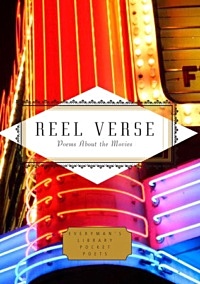 The variety of subjects is dazzling, from movie stars to bit players, from B-movies to Bollywood, from Clark Gable to Jean Cocteau.
The variety of subjects is dazzling, from movie stars to bit players, from B-movies to Bollywood, from Clark Gable to Jean Cocteau.
More than a hundred poets riff on their movie memories: Langston Hughes and John Updike on the theaters of their youth, Jack Kerouac and Robert Lowell on Harpo Marx, Sharon Olds on Marilyn Monroe, Louise Erdrich on John Wayne, May Swenson on the James Bond films, Terrance Hayes on early Black cinema, Maxine Kumin on Casablanca, and Richard Wilbur on The Prisoner of Zenda. Orson Welles, Leni Riefenstahl, and Ingmar Bergman share the spotlight with Shirley Temple, King Kong, and Carmen Miranda; Bonnie and Clyde and Ridley Scott with Roshomon, Hitchcock, and Bresson.
In Reel Verse, one of our oldest art forms pays loving homage to one of our newest—the thrilling art of cinema.
POPCORN PALACES
Meena Alexander, “South India Cinema” – John Allman, “Loew’s Triboro” – Robert Hayden, “Double Feature” – Robert Hershon, “1948: Saturdays” – Edward Hirsch, “The Skokie Theater” – Langston Hughes, “Movies” – Esther Lin, “Poem Ending in Antarctica” – Frank O’Hara, “Ave Maria” – Theodore Roethke, “Double Feature” – Jon Tribble, “Concessions” – John Updike, “Movie House” – Ellen Bryant Voigt, “At the Movies, Virginia, 1956”
FEATURE PRESENTATIONS
Amy Clampitt, “The Godfather Returns to Color TV” – Martha Collins, “Meanwhile” – Jane Cooper, “Seventeen Questions About King Kong” – Denise Duhamel, “An Unmarried Woman” – Amy Gerstler, “The Bride Goes Wild” – Allen Ginsberg, “The Blue Angel” – Juliana Gray, “Rope” – George Green, “Art Movies: The Agony and the Ecstasy” – Richard Howard, “King Kong (1933)” – Allison Joseph, “Imitation of Life” – Ron Koertge, “Aubade” – Maxine Kumin, “Casablanca” – Gerry LaFemina, “Variations on a Theme by Ridley Scott” – Laura McCullough, “Soliloquy with Honey: Time to Die” – John Murillo, “Enter the Dragon” – Stanley Plumly, “The Best Years of Our Life” – Anna Rabinowitz, “from Present Tense” – Philip Schultz, “Shane” – May Swenson, “The James Bond Movie” – Susan Terris, “Take Two: Bonnie & Clyde/Dashboard Scene” – Richard Wilbur, “The Prisoner of Zenda”
MORE STARS THAN IN HEAVEN
Frank Bidart, “Poem Ending with a Sentence by Heath Ledger” – Christopher Buckley, “For Ingrid Bergman,” – Gerald Costanzo, “Fatty Arbuckle” – Marsha de la O, “Janet Leigh is Afraid of Jazz” – Louise Erdrich, “Dear John Wayne” – Sonia Greenfield, “Celebrity Stalking” – Patricia Spears Jones, “Hud” – Jack Kerouac, “To Harpo Marx” – David Lehman, “July 13 from The Daily Mirror” – Vachel Lindsay, “Mae Marsh, Motion Picture Actress” – Patricia Lockwood, “The Fake Tears of Shirley Temple” – Robert Lowell, “Harpo Marx” – Sharon Olds, “The Death of Marilyn Monroe” – William Pillin, “You, John Wayne” – Nicole Sealey, “An Apology for Trashing Magazines in Which You Appear” – William Jay Smith, “Old Movie Stars” – John Wain, “Villanelle for Harpo Marx” – John Wieners, “Garbos and Dietrichs”
B MOVIES & BIT PLAYERS
Angela Ball, “To Lon Chaney in The Unknown” – Gregory Djanikian, “Movie Extras” Cornelius Eady, “Sam” – Martín Espada, “The Death of Carmen Miranda” – Kenneth Fearing, “St. Agnes’ Eve” – Edward Field, “Curse of the Cat Woman” – Richard Frost, “Horror Show” – Howard Moss, “Horror Movie” – Ogden Nash, “Viva Vamp, Vale Vamp” – Robert Polito, “Three Horse Operas” – Virgil Suarez, “Harry Dean Stanton is Dying” – David Trinidad, “Ode to Thelma Ritter” – William Trowbridge, “Elisha Cook, Jr.” – Chase Twichell, “Bad Movies, Bad Audience” – Marcus Wicker, “Love Letter to Pam Grier”
AUTEURS
Paul Carroll, “Ode to Fellini on Interviewing Actors for a Forthcoming Film” – René Char, “Antonin Artaud” – Robert Creeley, “Bresson’s Movies” – Robert Duncan, “Ingmar Bergman’s Seventh Seal” – James Franco, “Editing” – Major Jackson, “After Riefenstahl” – Claudia Rankine, “from Don’t Let Me Be Lonely” – Jean-Mark Sens, “In De Sica’s Bicycle Thief” – Vijay Seshadri, “Script Meeting” – David St. John, “from The Face, XXXVI” – Timothy Steele, “Last Tango” – Gerald Stern, “Orson” – Michael Waters, “Blue Ankle” – David Yezzi, “Stalker”
FLASHBACKS
Kim Addonizio, “Scary Movies” – Elizabeth Alexander, “Early Cinema” – John Berryman, “Dream Song #9” – Ryan Black, “This is Cinerama” – Richard Brautigan, “Mrs. Myrtle Tate, Movie Projectionist” – Kurt Brown, “Silent Film, DVD” – Elena Karina Byrne, “Easy Rider” – Nicholas Christopher, “Atomic Field, 1972 #6” – Rita Dove, “Watching Last Year at Marienbad at Roger Haggerty’s House in Auburn, Atlanta” – D. J. Enright,“A Grand Night” – Aniela Gregorek, “Cinema” – Joseph O. Legaspi, “At the Movies with My Mother” – Michael McFee, “My Mother and Clark Gable on the World’s Most Famous Beach” – Mihaela Moscaliuc, “Watching Tess in Romania, 1986” – Paul Muldoon, “The Weepies” – Carol Muske-Dukes, “Unsent Letter 4” – Tom Sleigh, “Newsreel” – Elizabeth Spires, “Mutoscope” – Michael Paul Thomas, “Movies in Childhood” – David Wojahn, “Buddy Holly Watching Rebel Without a Cause”
REMAKES
Billy Collins, “The Movies” – Carol Ann Duffy, “Queen Kong” – Albert Goldbarth, “Survey: Frankenstein Under the Front Porch Light” – Kimiko Hahn, “The Continuity Script: Rashomon” – Bruce F. Kawin, “Old Frankenstein” – Glyn Maxwell, “Disney’s Island” – Rajiv Mohabir, “Bollywood Confabulation” – Geoffrey O’Brien, “Voice Over” – Michael Ondaatje, “King Kong Meets Wallace Stevens” – Elise Paschen, “Red Lanterns” – Matthew Zapruder, “Frankenstein Love”
REEL LIFE
David Baker, “Violence” – Tom Clark, “Final Farewell” – Lucille Clifton, “Come Home from the Movies” – Hart Crane, “Chaplinesque” – Stephen Dunn, “At the Film Society” – Lynn Emanuel, “Blonde Bombshell” – Robert Hass, “Old Movie with the Sound Turned Off” – Terrance Hayes, “Variation on a Black Cinema Treasure: Broken Earth” – Marie Howe, “After the Movie” – Steven Huff, “Merton, Lax and My Father” – Ann Inoshita, “TV” – Weldon Kees, “Subtitle” – Haji Khavari, “Upon the Actor’s Longing for the Alienation Effect” – John Lucas, “Hollywood Nights” – Donna Masini, “A Fable” – William Matthews, “A Serene Heart at the Movies” – Eileen Myles, “Absolutely Earth” – Ishmael Reed, “Poison Light” – David Rigsbee, “Lincoln” – Muriel Rukeyser, “Movie” – Grace Schulman, “The Movie” – Gary Soto, “Hands” – George Yatchisin, “Single, Watching Fred and Ginger”
Reel Verse
Poems About the Movies
Edited by Michael Waters and Harold Schechter
Category: Poetry | Classics
Hardcover
256 Pages
Jan 22, 2019
Published by Everyman’s Library
ISBN 9781101908037
$14.95
# more poetry
Reel Verse
Poems About the Movies
• fleursdumal.nl magazine
More in: #More Poetry Archives, - Book News, Art & Literature News, AUDIO, CINEMA, RADIO & TV
Thank you for reading Fleurs du Mal - magazine for art & literature